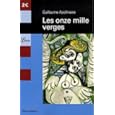Is Apollinaire obscene? The ECHR says: no!
 When I was growing up, I read a children’s book called The Arabian Nights, an innocent version of the Islamic classic One Thousand and One Nights. Perhaps surprisingly, a group of Egyptian lawyers has recently called for a ban of a newly-released version of the Nights, on the grounds that it is “obscene” and could lead people to “vice and sin”. At the same time, another Egyptian group has called for a ban on the controversial novel Azazeel (Beelzebub) by Youssef Ziedan, which won the 2009 International Prize for Arabic Fiction. And, irony of ironies, just in time for Bloomsday, a manga comic book version of James Joyce’s novel Ulysses had almost been banned from the Apple App Store for obscene images, but Apple then relented, and reversed its earlier decision to remove panels containing nude images, though it still continues to reject less famous apps.
When I was growing up, I read a children’s book called The Arabian Nights, an innocent version of the Islamic classic One Thousand and One Nights. Perhaps surprisingly, a group of Egyptian lawyers has recently called for a ban of a newly-released version of the Nights, on the grounds that it is “obscene” and could lead people to “vice and sin”. At the same time, another Egyptian group has called for a ban on the controversial novel Azazeel (Beelzebub) by Youssef Ziedan, which won the 2009 International Prize for Arabic Fiction. And, irony of ironies, just in time for Bloomsday, a manga comic book version of James Joyce’s novel Ulysses had almost been banned from the Apple App Store for obscene images, but Apple then relented, and reversed its earlier decision to remove panels containing nude images, though it still continues to reject less famous apps.
These examples of censorship of literature on the grounds of obscenity are simply the latest instances of a long and dishonourable tradition. In an earlier post, I considered whether Lady Chatterley’s Lover is obscene. In Akdas v Turkey 41056/04 (15 February 2010) (judgment in French; press release in English), the European Court of Human Rights was faced with a similar question earlier this year, when it had to consider whether a Turkish ban on Guillaume Apollinaire‘s Les Onze Mille Verges (or, The Eleven Thousand Rods) was consistent with Article 10 of the European Convention on Human Rights.…

